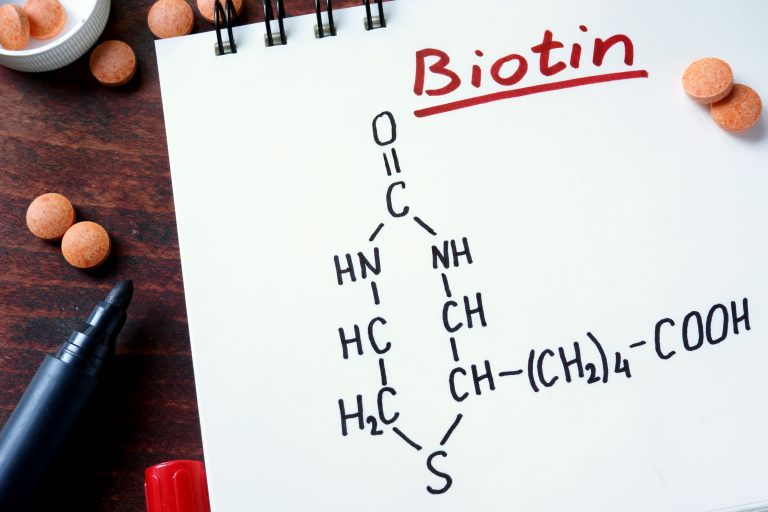
Page Contents
When you take anything for your health or hair, you are doubtless going to want to try to get the most of it. Part of getting the most out of anything you consume is knowing when the best time is to take it. Biotin supplementation is the same in this respect.
In order to understand why it is best to take biotin at a certain time, it is helpful to know what biotin is and what it does for you. Both of these things affect what time you should take biotin for the best results.
About Biotin
Biotin is rarely, but sometimes called by Vitamin H. Slightly more common than that, biotin is referred to as Vitamin B7. As one of the B vitamins, biotin works right along with the other Bs and helps give you energy.
The energy it helps you with is just one of the things biotin does for you, however. It also helps with your hair, nails, and skin, as you have probably already heard about. Biotin also has some benefits for your digestion, which is helpful for many things.
It also offers assistance to your nerves, including healing nerve damage, being a good thing for you if you have a nerve disease. Then, liver health is also supposedly helped by biotin, though this is less known and has not been as verified.
This vitamin may very well help with more than that, but not enough studies have been done on it to prove it. Also, more about the human body, its needs, and how it functions is being learned nearly every day.
Biotin is found in lots of different foods, many of which you doubtless already eat. Eggs, tomatoes, and soy are things you probably already consume. You may also eat liver, soy, and mushrooms. All of the above have biotin in them, as well as many other foods.
Considering just how many common foods have biotin in them, it is very rare to end up with a biotin deficiency. However, a deficiency here is possible in certain circumstances, which is why you made need to take additional biotin.
All in all, biotin may not be one of the most common or most necessary vitamins. However, biotin is something that you will notice the absence of if you are not getting enough.
Why You Might Need Biotin
From the description of biotin itself, you can likely already guess why you might need biotin. The better question about biotin is perhaps why you might need to take a supplement. To start with, it shouldn’t be surprising to know that, out of all the different medical conditions out there, some of these affect your biotin absorption.
True, not many medical conditions have this effect. It is mostly digestive issues, the ones that make it hard to absorb any nutrients, that interfere with absorbing biotin. However, one or two specifically prevent biotin absorption.
Then, extra biotin might be needed for specific things. Your biotin level can affect your nail growth, skin health, and your hair. Thinning hair may be helped with an extra amount of biotin, as biotin can help with keratin production.
As keratin is vitally essential to your hair growth, being one of the main things that your hair is made up of, the fact that biotin can help with your keratin means that it can do a world of good for your hair health. This is also why biotin is used for those trying to combat thinning hair.
Finally, as one of the ever popular B complex vitamin ingredients, biotin is often included in Vitamin B complexes. This makes knowing when to take your biotin fairly easy to understand.
Why Morning Is Best For Taking Biotin

Being a B vitamin, it should be fairly obvious for at least one reason why taking biotin in the morning is better. Biotin, like the other Bs, can give you a little energy. That energy is great to have first thing in the morning. However, you don’t want that energy in the evening before bed if you want to rest soundly.
The other reason biotin is best taken during the morning, and why dietary supplements in general are usually recommended to be taken then too, is actually because of your digestion. Your digestion tends to slow down as you sleep.
During night time and sleeping, your body has other things that it takes care of, meaning digestion takes a backburner. Therefore, during this time, nutrients you may have recently consumed do not get absorbed as well as during the day.
So, you want the biotin to have been completely absorbed before you retire for the night. While you aren’t required to take biotin first thing in the morning, the earlier on in the day you take it, the more chance you have of absorbing as much of it as possible.
Other Tips For Getting The Most Of Biotin
Other than making sure you take biotin at the right time, there are a couple of other ways to make sure that you get the most from your biotin intake. For starters, biotin can be taken on an empty stomach or, at the least, thirty minutes before or an hour after eating breakfast.
Next, making ensuring that your gut is healthy and is digesting food properly is also necessary. If your digestion is lacking, then you won’t be able to absorb the needed amounts of almost anything, including biotin.
So, taking things like probiotics, digestive enzymes, and other things that improve this will help you absorb more of the biotin as well. This can be done with fermented foods, supplements, or a few other ways.
Next, there is also simply taking care of yourself. Those in good health also get the most from foods. As mentioned, certain conditions medically can prevent you from getting the biotin you need. Specific liver problems fall in this category.
In these cases, dealing with the medical problem can improve your biotin absorption most of the time. This is why treating these conditions is important, even if you don’t feel that they are ‘too bad’ and you want to avoid the medications to help them.
Lastly, taking the right amount of biotin is also going to make sure you get the most from it. There is no real agreement on how much biotin you should be taking. Most say 30 micrograms (mcg) for adults, but some say as much as 10 milligrams (mg) is good for those with hair loss or some other such problem.
As 10 mg is 10,000 mcg, that is a very high dose. However, most biotin supplements come in a 5000 mcg (5 mg) size, which is fine for most people.
A Caution
Another part of knowing when to take biotin is knowing when not to take biotin. The answer to this would be within 24 hours of having a lab test done. Specific types of lab tests and blood work can have their results skewed by extra biotin levels.
One of these tests is the one that measures your thyroid hormones. The result of this falsified information on the test can mean that you end up being diagnosed with a thyroid condition you don’t actually have.
If you are prescribed, and then take, the medication for your non-existent thyroid condition, this will cause other problems. Obviously, it will affect your thyroid, but taking the medication may well give you other side effects.
In short, it is a bad thing all the way around. So, before having any lab test done on your blood or hormones, our medical advice is to avoid taking biotin one day, if not two, beforehand.
Final Thoughts
Taking biotin as a dietary supplement is not something everyone needs to do. Only those with a biotin deficiency really need to take it, though many others can benefit from it even if they are not deficient.
However, some people really need biotin, more than what they can get in their food and especially if they have thinning hair. So, start taking biotin, and make sure that you take your biotin supplement at the right time for healthy hair. If you look, many hair loss supplements actually have biotin in them, making this even easier.






